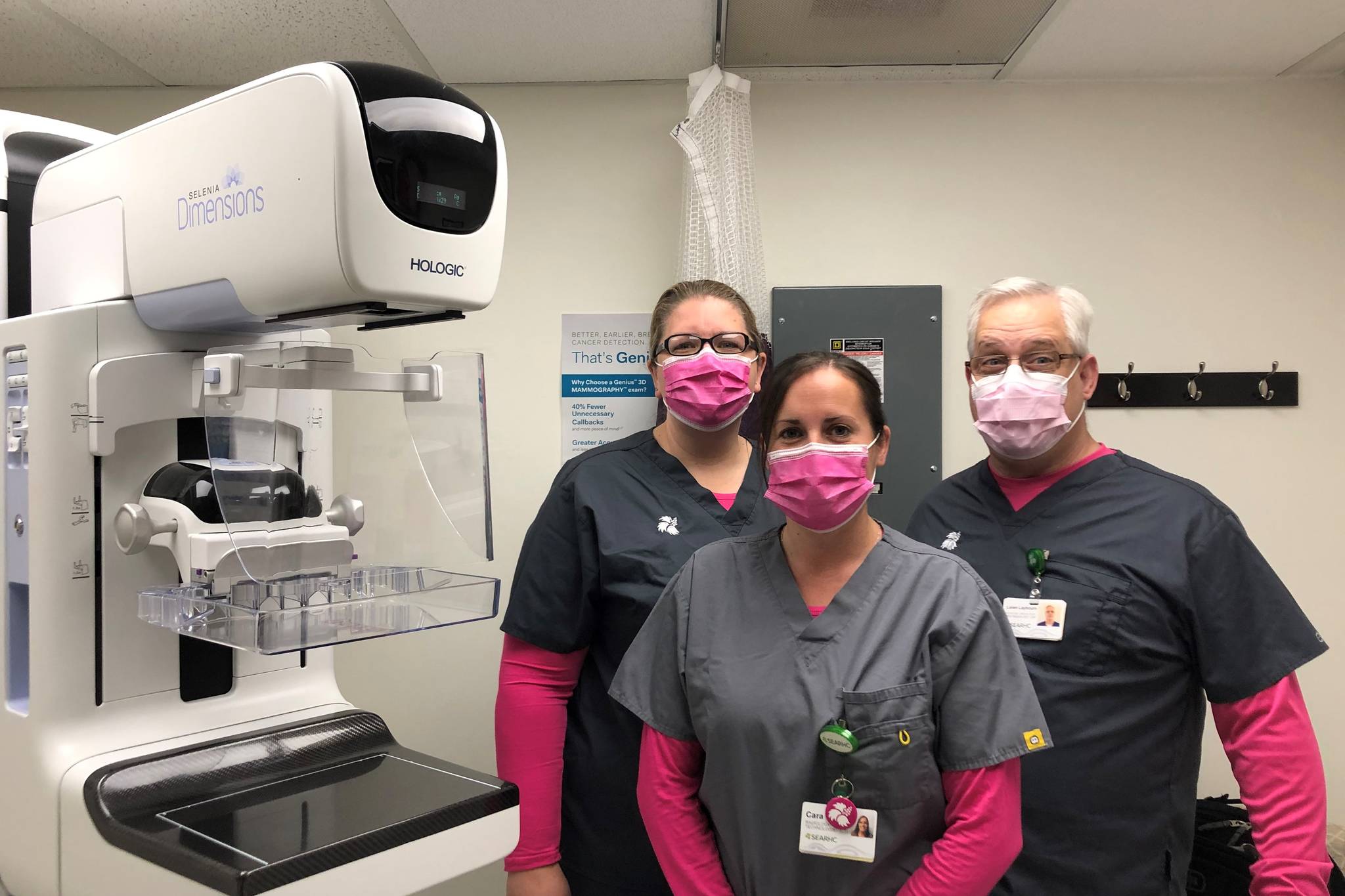Southeast Alaska Regional Health Consortium is offering free screenings for its patients in Sitka and Wrangell in honor of October as Breast Cancer Awareness Month,. Even though those free services aren’t being offered in Juneau, SEARHC’s clinical lead for the screening program, Pam Sloper, said women over 50 should still get screened regularly.
“It’s a really good idea to have them. Mammograms have been around for a while and they been shown to reduce the risk of death due to breast cancer,” Sloper said in an interview Monday. “It’s really important that women keep up on any kind of screening during this pandemic.”
Some people are nervous about visiting health clinics during the COVID-19 pandemic, Sloper said, but health care professionals are taking the utmost care at those facilities, which she said were as safe as possible right now. SEARHC also has 3D screening machines which gave better data and produced less false positives.
Bartlett Regional Hospital lead mammographer Renee Daniels said examining 2D imaging compared to 3D imaging is like looking at a single page of a book versus fanning through the pages. The extra dimension allows health care professionals to examine down to the millimeter, she said, producing more accurate results. Bartlett Regional Hospital also has a 3D imaging machine, she said, and while the hospital can’t offer screening for free, it’s relatively easy for women to schedule a screening.
As long as women aren’t showing symptoms of breast cancer, which would require a different kind of test, Daniels said women can schedule an appointment.
But for women who are getting a mammogram for their first time, Daniels recommends scheduling an appointment with a doctor.
[Pioneer Home administrator: No cases in Juneau]
“First thing they should do is see their doctor if this is their first, ever,” she said.
Doctors can write orders for mammograms, she said, but women can self-request mammograms if they’ve seen their doctor within the past year. After the first, mammogram screenings are typically done quickly and don’t require a visit to the doctor. That’s where Bartlett’s 3D imagining machine could help to reduce the stress of screenings.
Daniels said the manufacturer claims the machine reduce the amount of “callbacks,” patients being called back for further screenings, by up to 40%. Those callbacks were often the most anxiety-producing, she said.
“When people have to wait and don’t know what’s going on,” she said. “If we can get folks in and out, that’s little less stress.”
There are state and federal resources available to help women get access to screenings. The hospital offers information through its health library webpage about the importance of regular screening and risk factors for breast cancer.
The screening program Sloper runs is part of a Centers for Disease Control and Prevention effort called WISEWOMAN, which stands for “Well-Integrated Screening and Evaluation for WOMen Across the Nation.” The program operates in 21 states and with three tribal organizations, two of which are Alaskan; SEARHC and Southcentral Foundation.
The Alaska Department of Health and Social Services has the Ladies First program which helps eligible women receive breast and cervical cancer services.
The age range for women who should get screened depends on who you ask, Sloper said, but SEARHC recommends screening for women aged 50-69, BRH recommends women start at age 40. Women with family histories of cancer may be at increased risk, Sloper said, and the CDC has a list of other risk factors.
Breast cancer is easier to treat when it’s detected early, according to the CDC, which recommends women ages 50-74 get mammograms every two years, and women in their 40s speak to their health care providers about regular screenings. Breast cancer can occur in men, the CDC says, but it’s rare.
Worldwide, the majority of deaths from breast cancer occur in low and middle-income countries where most women with breast cancer are diagnosed in late stages due mainly to lack of awareness on early detection and barriers to health services, according to the World Health Organization.
“It’s really important for women to get out and get those screenings,” Sloper said. “If you put things off, that can be detrimental.”
• Contact reporter Peter Segall at psegall@juneauempire.com. Follow him on Twitter at @SegalljnuEmpire.

